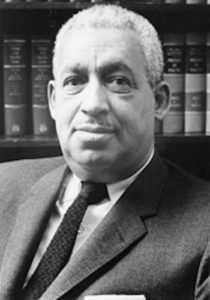
William Ming Jr.
*William Ming Jr., a black lawyer and law professor, was born on this date in 1911.
William Robert Ming Jr. was born in Chicago to Annie and William Ming Sr., a South Side Chicago municipal employee. Young Ming Jr. worked as a grocery clerk and on wrecking crews while putting himself through the University of Chicago. He was initiated into the university's Iota Kappa Alpha Psi fraternity chapter in 1930. Ming earned a Ph.B. degree in 1931 and his J.D. degree in 1933 from the University of Chicago Law School, graduated from Order of the Coif, became one of the first Black members of a law review, and was published in the University of Chicago Law Review's inaugural issue.
Ming was admitted to the bar in 1933 and subsequently practiced law in public and private capacities. He volunteered and served in the Army's Judge Advocates General Corp, rising to the rank of captain. Before serving in 1941, Ming played a role in the NAACP's unsuccessful opposition to forming a segregated U.S. Army Air Corps fighter group for Blacks. This would come to be known as the Tuskegee Airmen, supporting an early lawsuit by an African American whose application for pilot training had been denied.
Ming was one of the architects of the legal strategy leading to the Supreme Court's landmark decision in Brown v. Board of Education, working on the litigation team for that case and on a number of the critical instances leading to Brown, including Shelley v. Kraemer, Sweatt v. Painter and McLaurin v. Oklahoma State Regents.
In Montgomery, Alabama, in May 1960, in front of an all-white jury, Ming helped defend Martin Luther King Jr. on perjury charges related to alleged tax evasion, obtaining an acquittal. A "reluctantly admiring" Alabama lawyer was quoted as: "Negro or not, he is a master of the law." King wrote of the trial as a "turning point" in his life and praised Ming and his other principal lawyer, Hubert Thomas Delany: "They brought to the courtroom wisdom, courage, and a highly developed art of advocacy; but most important, they brought the lawyers' indomitable determination to win. After a trial of three days, by the sheer strength of their legal arsenal, they overcame the most vicious Southern taboos festering in a virulent and inflamed atmosphere, and they persuaded an all-white jury to accept the word of a Negro over that of white men." King's wife, Coretta Scott King, would later say of the trial: "A southern jury of twelve white men had acquitted Martin. It was a triumph of justice, a miracle that restored your faith in human good."
In addition to his litigation work, Ming served in leadership and other capacities such as ACLU counsel, National Veterans Organization President, Illinois Commerce Commission attorney, a member of the Chicago NAACP Branch and the Illinois State Conference of the NAACP, and as a member of the NAACP National Board of Directors. Ming was a professor at both Howard University School of Law and the University of Chicago Law School, teaching the latter from 1947 to 1953. He became the first African American full-time faculty member at a predominantly white law school.
In 1970, Ming was prosecuted for tax evasion and, despite having paid the back taxes and fines, was sentenced to 16 months in prison. In January 1973, he began to serve his sentence. Several friends and colleagues urged authorities to grant him parole and release him from prison. After a stroke, Ming was paroled and sent to the Veteran's Research Hospital in Chicago. William Robert Ming Jr. died in a hospital in Chicago on June 30, 1973.
In his eulogy, colleague Robert L. Tucker noted Ming's "finer and most productive years were spent in the trenches and upon the blood-stained battlefields" of the American Civil Rights Movement. In April 1974, the NAACP National Board of Directors created the William Robert Ming Advocacy Award to be awarded annually to a lawyer "who exemplifies the spirit of financial and personal sacrifice that Mr. Ming displayed in his legal work for the NAACP."